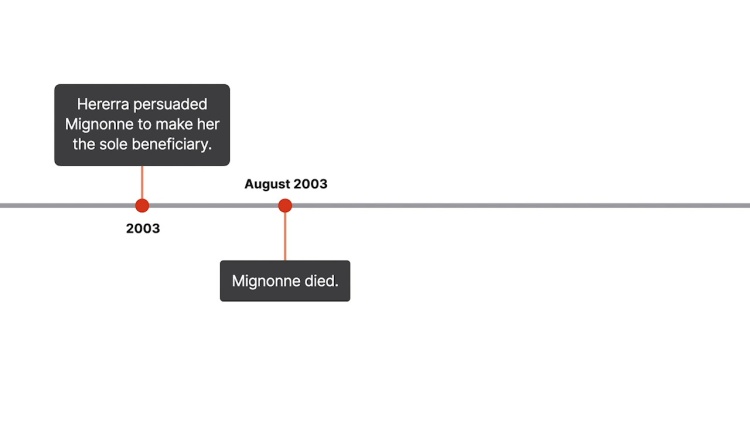Schilling v. Herrera
Florida Court of Appeal
952 So.2d 1231 (2007)

- Written by Christine Raino, JD
Facts
Following a diagnosis of renal failure, several hospitalizations and a stay at the Clairidge House for rehabilitation, Mignonne Helen Schilling (Mignonne) received occasional care at home from Maria Herrera (defendant) until her condition worsened and she moved into an apartment in Herrera’s garage. Mignonne paid rent and compensated Herrera for her services until Mignonne’s death on August 6, 2004. Prior to Herrera’s involvement, Mignonne’s will, durable power of attorney and power of attorney for health care made her brother, Edward Schilling (Edward) (plaintiff), her sole heir and sole decision maker regarding her health and finances. While Herrera was caring for Mignonne, Herrera induced Mignonne to execute a new will and power of attorney giving her entire estate and full control of her finances to Herrera. When Mignonne died, Herrera probated the will, but waited until December 6, 2004 after the creditor period expired and after she petitioned for discharge of probate, to tell Edward that his sister had died on August 8, 2004. Edward, who lived in another state but visited his sister and helped pay Herrera for caring for Mignonne during her illness, had been attempting to communicate with his sister through Herrera, but Herrera would not return his calls and did not communicate with him until after the probate process was complete. Edward sued Herrera for intentional interference with an expectancy of inheritance, claiming that she engaged in a fraudulent scheme to prevent him from challenging the will Herrera induced his sister to execute. The trial court dismissed the complaint finding that Herrera had no duty to notify Edward of his sister’s death and for failure to exhaust probate remedies. Edward appealed.
Rule of Law
Issue
Holding and Reasoning (Rothenberg, J.)
What to do next…
Here's why 905,000 law students have relied on our case briefs:
- Written by law professors and practitioners, not other law students. 47,100 briefs, keyed to 995 casebooks. Top-notch customer support.
- The right amount of information, includes the facts, issues, rule of law, holding and reasoning, and any concurrences and dissents.
- Access in your classes, works on your mobile and tablet. Massive library of related video lessons and high quality multiple-choice questions.
- Easy to use, uniform format for every case brief. Written in plain English, not in legalese. Our briefs summarize and simplify; they don’t just repeat the court’s language.





